Heart disease can be a major burden. Most people think they just appear out of nowhere, without any warning signals from the body. However, it is very important to recognize these signals, not only to protect your own health, but also to save the lives of those around you. If you recognize any of the following symptoms, be sure to visit your doctor for more information. The most important thing is not to simply look away from these signs, as this could save several lives
Fatigue
Fatigue is defined as a state of physical weakness. It is a state in which the body craves sleep and at the same time has little energy and strength. It often happens after a hard, exhausting day, but if you feel tired for no reason, keep your eyes open, literally. The warning signs of cardiac arrest can be causeless exhaustion and tiredness. So if you are no longer able to do everyday things, it probably means that the amount of blood in your heart has been reduced. These are very common signs and also result in excessive sleep. If such a condition affects you and lasts for a long time, you should contact your doctor to find out what is causing this fatigue and what should be done about it. Of course, there is also the possibility that this fatigue is a sign of another serious illness

Fatigue
Unconsciousness
Do you sometimes pass out? Do you often faint? This could definitely be a warning sign of heart disease. Unconsciousness can be caused by several things, such as extreme physical exertion, pain and dehydration. One cause could be heart disease, as it usually begins with a drop in blood pressure, which in turn causes a lack of oxygen in the blood. The lack of blood in the brain leads to fainting. The majority of tachycardia and bradycardia sufferers describe that they initially experienced fainting spells. So if people around you complain of fainting or passing out, they strongly advise you to see a doctor!

Unconsciousness
Rapid weight gain
Has your body changed rapidly lately? Do you no longer fit into your favorite clothes? Your heart may be trying to tell you something… One possible symptom of heart disease is the accumulation of fluids, which can result in bloating, swelling and ultimately drastic weight gain. While you can alleviate these symptoms with treatments, it is important to monitor weight changes regularly and see a doctor. A noticeable rapid increase in weight can never be healthy and can also result in other health problems. So if you notice within a short time that you no longer fit into your favorite outfits, you should not hesitate to contact a doctor

Rapid weight gain
Nausea and loss of appetite
Indigestion, nausea and loss of appetite can all be causes of heart failure and lead to bloating. All of these can also be signs of heart problems. If these signs suddenly appear, go to the doctor. Of course, this is not a reason to be anxious, as these symptoms can occur in everyone. However, these symptoms are often mistaken for digestive problems and are therefore ignored. It may also be a sign of pregnancy, but to be sure, it is best to consult a doctor. If it is a heart problem, consult a cardiologist

Nausea and loss of appetite
Irregular heartbeat
A racing heart is not a major concern for most people. It can be triggered by adrenaline or excitement. However, if it happens regularly that the heart skips a few beats, a doctor should be consulted as soon as possible. An irregular heart rhythm can indicate an arrhythmia, which should be treated so that the heart beats properly again and the body is supplied with blood again. Arrhythmias can also increase the risk of having a stroke. It is therefore all the more important to see a doctor so that he or she can interpret what the problem is
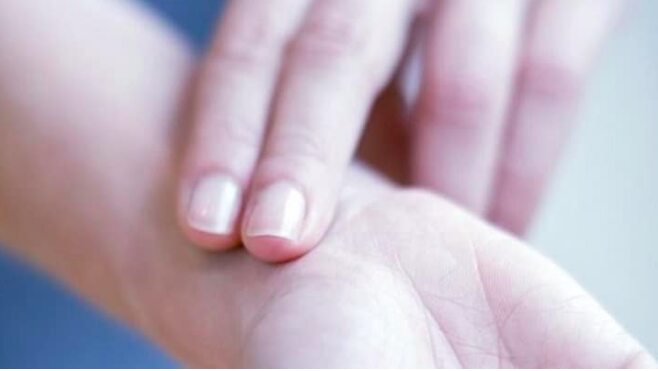
Irregular heartbeat
A persistent cough
Have you been coughing for a long time without any real explanation? This can also be a warning sign of heart disease and you should see a doctor as soon as possible. As soon as the heart has problems supplying the body with enough blood, this can enter the lungs and cause a cough. This cough could indicate heart disease. It is therefore important to observe the color of the cough, because if it is pink or whitish, this could be an indication of possible heart disease. This cough is usually worse at night when you are lying down. Of course, this symptom may be due to other diseases such as lung cancer or tuberculosis… so it’s best to seek advice from your doctor

A persistent cough
Cold sweat
If you have cold sweats without any exertion or exercise, this could indicate a warning signal from the heart. Normally you sweat to regulate your body temperature. However, when a person sweats to an excessive degree, the heart tries to pump narrow arteries and it becomes problematic to flush the whole body. As soon as these signs appear along with other symptoms, you should make an immediate visit to the hospital. In addition to this, it is important to know that cold sweats can be caused by infections, cancer, brain diseases, medication or stress, for example. So it is especially important to act quickly and go to the hospital if you experience these problems

Cold sweat
Dizziness
Of course, most people experience dizziness in certain situations. But if you experience dizziness for no reason, contact a doctor as soon as possible. It could be a sign of heart disease. In normal circumstances, if you feel dizzy, there is no need to worry, as the causes are usually dehydration, malnutrition or low sugar levels. These things are commonplace and can affect anyone. But apart from that, dizziness can often be a sign of a heart problem. So it is important to notice this symptom first. Because if you notice this sign in time, some heart diseases can still be prevented

Dizziness
Sleep disorders
From time to time, everyone suffers from sleep disorders, for which there are also various solutions and healing methods. However, you should also consider heart problems as a cause for your lack of sleep. If you keep your eyes open for hours at night and other warning signs appear at the same time, it could be possible that you are suffering from a heart condition. The signals can manifest themselves in different ways. If the lack of sleep is due to breathing difficulties, chest pain or rapid palpitations, you should consult your doctor. Before you do anything about it, you should definitely consult a doctor

Sleep disorders
Inflammation of the gums
Do you have pain or even traces of blood when brushing your teeth? You should definitely not ignore this, as it could be due to a problem with your heart. If you notice that your gums are swollen and you occasionally experience bleeding gums, this could be a sign of heart disease. Even mild symptoms, such as an inflamed palate, can be a signal of bacteria in the bloodstream leading to clots. Apart from this, it is well known that the health of teeth and the heart are linked. So if a healthy heart is important to you, don’t neglect your teeth either
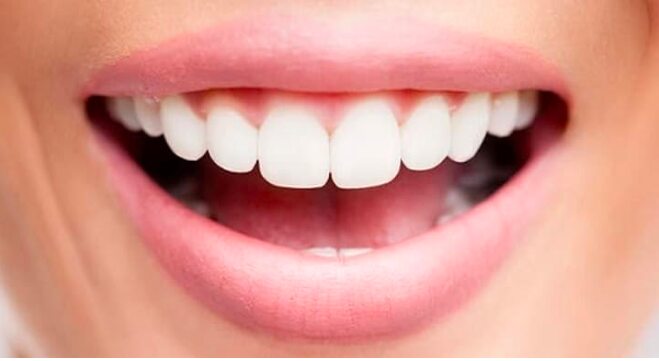
Gum inflammation
Snoring
Not only is it uncomfortable to have to sleep next to someone who snores, but it’s even more uncomfortable when that person is you. In any case, this snoring could indicate a heart problem. Snoring doesn’t have to be a bad thing, but if you hear strange noises from time to time, you may have breathing problems, which could be a sign of heart disease. Pay attention to this even with those sleeping next to you. Another sign could be the stopping of the heartbeat for a few seconds (sleep apnea). This is a very common problem and there are already several treatments available. However, it is best to consult a doctor about it

Snoring
Pain in the upper body and arms
Do you feel indefinable pain in your arms and chest? You are probably suffering from heart problems and should react immediately! In the case of an impending heart attack, the pain usually starts in the upper body and then radiates to the shoulders and neck. But this is not always the case! The pain can also start in other parts of the body. For example, in the right or left arm, in the back or even in the mouth. There are many possible causes and there are no standardized rules. One thing is certain, however: consult a doctor urgently if you have pain in your arms!

Pain in the upper body and arms
Shortness of breath
If you become short of breath after just a little exertion, you should take this seriously. It could be due to heart disease. Do you feel weak and out of breath even after light activities? It is possible that your cardiovascular system is overloaded, your lungs no longer have enough oxygen and you are experiencing breathing difficulties as a result

Shortness of breath
Chest pain
Chest pain should always be taken seriously. It can be caused by a serious heart problem and must be checked out immediately in the emergency room if it is severe and sudden. It is usually accompanied by breathing difficulties. Sometimes there is also a tight or burning sensation in the middle or on the right side of the chest. In the case of a heart attack, these symptoms can occur suddenly and then last for several minutes. In this case, the blood can no longer be pumped to the heart, which is a life-threatening situation. Call the emergency services immediately!
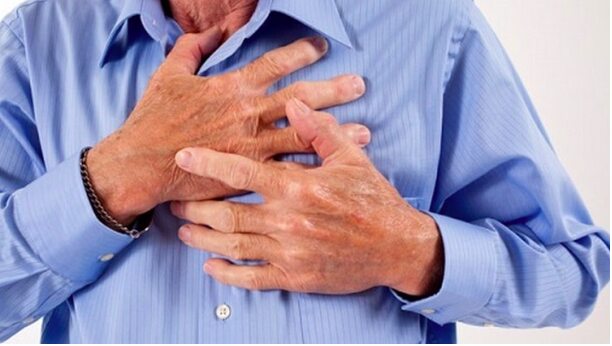
Chest pain
Butt or thigh cramps when walking
Cramps in the thighs, calves or buttocks are not always a sign of magnesium deficiency, but can sometimes indicate heart disease.
The University of Pittsburgh Medical Center (UPMC) often recognizes aortoiliac occlusive disease in this case, which must be treated quickly!

Butt or thigh cramps when walking
Hairless legs
Some women don’t have to deal with epilating and hair removal on their legs because they have no hair growth there, but sometimes this can be a sign of a circulatory condition due to a peripheral arterial problem. Accumulated plaque in the arteries leads to impaired circulation in the limbs and, as a result, hair loss on the legs. According to the “McLeod Health” service in South Carolina, cool, smooth and shiny skin can be observed in this case, so please pay attention to your legs if hair growth stagnates!

Hairless legs
Colorful mucus when coughing
A persistent bloody or pink mucousy cough could be attributed to a buildup of fluid in the lungs. According to the AHA, American Heart Association, this could be a warning sign of heart disease. Please consult your doctor, who will then examine your lungs and heart!

Colorful mucus when coughing
Very frequent nocturnal awakenings
Do you have to urinate frequently at night even though you haven’t drunk for at least two hours before going to bed? According to the Mayo Clinic, the increased urge to urinate could indicate heart failure. The kidneys could also be affected. It is therefore essential that you see a doctor to clarify the symptoms!

Very frequent nocturnal awakenings
Discomfort in the chest
Discomfort in the chest area must always be taken seriously. It can manifest as a feeling of fullness, heartburn or pain in the center of the chest and last for a few minutes. Sometimes this feeling disappears and then reappears. According to the AHA, these symptoms may indicate an impending heart attack. Please do not waste time watching or waiting for your symptoms! You need immediate help, it is best to call the emergency services!
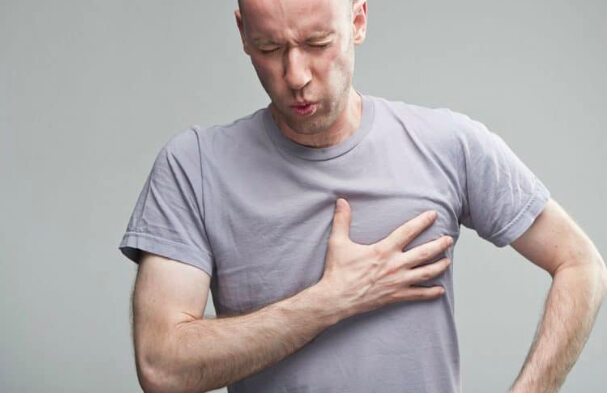
Chest discomfort
Erectile dysfunction
There are several causes of erectile dysfunction. One of them could be heart disease. During an erection, the organ needs an additional blood supply. However, this could be interrupted due to blocked arteries. Therefore, please always consult your doctor, as a heart problem could also be the cause in this case!

Erectile dysfunction
Confusion and mental disorders
Memory and concentration problems, confusion and forgetfulness can be symptoms of heart failure. This can happen when the chemicals in the blood change (AHA). One cause of this could be a change in sodium levels. Of course, fatigue or lack of nutrition can also be a cause, but there is a possibility of a heart problem. So see your doctor

Confusion and thought disorders
Sleep apnea
Sleep apnea is a sleep disorder in which breathing stops for a short time during sleep. According to the AHA, this can lead to strokes, high blood pressure, heart failure and heart attacks as well as cardiac arrhythmia. Please be sure to consult a doctor if you suffer from sleep apnoea!

Sleep apnoea
Panic attacks
Panic attacks can easily be confused with heart attacks because they show similar symptoms: Anxiety, tightness in the chest, sweating, severe palpitations, dizziness and weakness. (According to UPMC) Again, it is particularly important to check these symptoms with a doctor

Panic attacks
A sudden blow to the chest
If you have the feeling that your heart is beating irregularly and you can feel the heartbeat, then this could be a symptom of atrial fibrillation. According to the AHA, there is an increased risk of a stroke. Please go to the doctor and ask for clarification!

A sudden blow to the chest
Breathing difficulties
If you suffer from breathing problems even when resting, this could be due to heart disease. If fluid enters the lungs due to a lack of blood supply to the blood vessels, this can cause breathing problems. If detected early, your doctor can save your life!

Breathing problems
Sudden migraine
Whether they come on suddenly or slowly, nobody likes migraines. However, if they come on very suddenly and are very severe, this could be a warning sign. According to the Mayo Clinic, a severe migraine, combined with vomiting and dizziness, can also indicate a blood clot in the heart or a stroke Please get medical help immediately!

Sudden migraine
Excruciating back pain
Back pain is not always due to injury. It can also be associated with heart disease. Severe chest pain that radiates to the upper and lower back can be a sign of a heart attack, according to the Cleveland Clinic. It’s important to respond immediately. Please notify a physician immediately!”

Excruciating back pain
Swelling of the legs
Have your feet or legs been swelling up a lot lately for no reason? Maybe it’s your heart trying to tell you something! Swelling in the legs often means that too much fluid is accumulating in the body (fluid retention) and this could be a sign of a heart problem. Often the legs and feet are most affected, they become swollen as the distance to the heart is greatest from there. As soon as the swelling gets worse, it is best to seek medical advice to prevent any risks. It is important to know that sometimes other serious diseases can also be the cause of swollen legs
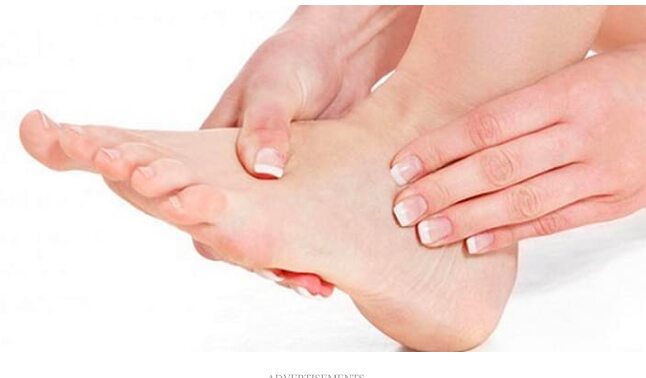
Swelling of the legs
If you want to prevent cardiovascular disease, there are plenty of ways to change and optimize your diet. This does not mean that you should only eat fruit and vegetables. Although this is healthy, it is also one-sided. There are numerous other foods that you should eat. In the following list, we have listed foods that provide the body with important nutrients and vitamins
Chickpeas
They are small and full of important nutrients and fiber. Potassium, which is very important for the heart muscle, and other vitamins can be found in these small peas. Chickpeas can also lower cholesterol levels and reduce the risk of heart disease. They can be prepared in a variety of ways, such as hummus

Chickpeas
Coffee
Coffee fans can breathe a sigh of relief. The bitter drink is good for the heart. Coffee can protect against heart attacks and even stroke. Of course, coffee, like almost everything else, should be enjoyed in moderation and preferably without sugar

Coffee
Cranberries
Not only delicious but also very healthy. Cranberries are full of antioxidants and nutrients. They reduce the risk of heart disease and also prevent and help with bladder infections and inflammation. The small berries are also ideal for preventing gum problems, stomach ulcers and cancer. Caution: Cranberries are often sugared, which should of course be avoided

Cranberries
Figs
Figs are particularly popular in the Mediterranean region. Whether eaten savory or on their own, they taste wonderful. They are also a great source of nutrients for the heart. The fruit is full of calcium and fiber. Figs can also protect against heart disease

Figs
Linseed
If you don’t like fish and nuts, it’s best to switch to linseed. The seeds are full of good omega-3 fatty acids which are not only good for the heart but also for blood pressure. Flaxseeds are usually eaten in muesli, but you can also bake delicious bread with them

Flaxseeds
Red chili peppers
Not everyone likes spicy food, but the peppers contain capsaicin which dilates the blood vessels, thus improving blood flow and getting the circulation going. Cholesterol levels are also lowered. You don’t have to eat a lot of it, but a little spiciness in your food from time to time is good

Red chilli peppers
Ginger
Ginger is a real all-rounder. Regular consumption of ginger can prevent high blood pressure and heart disease. Ginger also has an antibacterial effect and is therefore a popular drink for colds. Stomach problems are also alleviated and the tuber is naturally full of other good nutrients.

Ginger
Grapefruit
Grapefruits contain lots of fiber, antioxidants and provide energy. No wonder the fruit is often eaten in the morning. Grapefruit can also help with high blood pressure. Just 100 grams cover the daily requirement of vitamin C and the citrus fruit is also suitable for the breakdown of fat and thus also relieves the liver.

Grapefruit
Green tea
The antioxidants contained in green tea protect the body from free radicals. The slightly bitter tea also has a very anti-inflammatory effect and is recommended for cardiovascular problems. The additional tannins soothe the stomach and intestines and even prevent tooth decay

Green tea
Kidney beans
Rich in magnesium, protein and folic acid. The beans are low in fat and high in fiber. The homocysteine level is lowered, reducing the risk of stroke. It is also recommended to eat kidney beans as a preventative measure for heart problems and even cancer. Whether in soup, stew or salad, the beans are versatile

Kidney beans
Oranges
Who doesn’t love oranges? The citrus fruit can be squeezed into juice, used in cakes and even in savory dishes. The fruit absorbs the cholesterol in food. Fibre, nutrients and a lot of vitamin C make the fruit one of the most popular types of fruit

Oranges
Kale
Kale belongs to the cruciferous family. It is more of a winter vegetable but is also often found in supermarkets in summer. Kale contains many important nutrients which are good for heart problems and can have a preventative effect. It also contains a lot of omega-3, antioxidants and fiber. Kale is low in calories and fat and is therefore also good for weight loss

Kale
Garlic
Garlic belongs to the leek family and is not only used to keep vampires away in the movies. Garlic is extremely healthy and can lower high blood pressure. It contains vitamins B1, B6 and C, as well as calcium, copper, manganese and selenium and therefore strengthens the immune system and the body’s own defenses.

Garlic
Red wine
Whether with dinner or just for fun, wine, especially red wine, is said to help with cardiovascular disease and prevent high cholesterol levels. The antioxidants it contains are also good for blood circulation and can prevent blood clots

Red wine
Chocolate
Chocolate is perfectly fine from time to time. Especially dark chocolate. The higher the cocoa content, the better. Chocolate not only releases happiness hormones but can also protect against heart disease and stroke. A Harvard study has shown that regular consumption of raw cocoa improves blood pressure. Eaten in moderation, chocolate therefore protects against dangerous cardiovascular diseases.

Chocolate
Lentils
Legumes can truly work wonders. They promote heart health and are an excellent source of potassium, protein and magnesium. They reduce the risk of heart disease and stroke and lower blood pressure and cholesterol levels. They are particularly tasty in stews, soups or simply as a side dish

Lentils
Almonds
Almonds are very tasty and versatile. The healthy fats in them are good for the nervous system, fight heart disease and reduce cholesterol. They curb the appetite and keep you full for a long time, making them the perfect snack between meals

Almonds
Pomegranate
On in smoothies, salads or shakes, pomegranate seeds are delicious and very healthy. They contain many antioxidants which protect the arteries from calcification and keep free radicals away. They protect against heart disease and can help prevent prostate cancer, diabetes, stroke and Alzheimer’s disease. Pomegranates are also healthy for teeth and skin. A real beauty booster

Pomegranate
Blueberries
They are full of antioxidants and nutrients. The blue berries are perfect for people with high cholesterol or high blood pressure. It is recommended to eat blueberries three times a week to prevent heart disease and cancer

Blueberries
Beet
Beet is recommended for heart problems and has a preventative effect against cancer. The tuber contains many vitamins such as vitamin A, C, B and folic acid. However, it is advisable to wear gloves when handling beet as it leaves your hands red

Beetroot
Salmon
Salmon is a real delicacy and very popular with many people. It contains a lot of omega-2 and other nutrients. It prevents heart disease and blood clots. It is recommended to eat about 70 grams of salmon or other fatty fish per week

Salmon
Turmeric
Turmeric is a miracle cure and is excellent for joint pain, bloating and flatulence. It reduces the risk of heart disease and also has an anti-inflammatory effect. Turmeric goes very well with meat dishes but is also great in shakes

Turmeric
Chia seeds
Chia seeds made a name for themselves a few years ago when they were used in shakes, smoothies and the like. However, the seeds have been known for their healthy effects for much longer. They are a perfect source of antioxidants, proteins and nutrients. Chia also contains omega-3 and helps to lower cholesterol. The seeds are filling for a long time and swell in the stomach, making them ideal for weight loss

Chia seeds
Apples
In English there is a saying which translates as “An apple a day keeps the doctor away”. There may be some truth to this saying as apples are full of minerals, antioxidants and vitamins. They reduce the risk of heart disease and lower blood pressure. They come in so many colors and varieties that there is sure to be an apple to suit everyone.

Apples
Avocados Avocados are particularly popular. From a botanical point of view, the fruit is a berry. However, they are delicious and contain healthy fats which are not only good for cholesterol levels but can also protect against dangerous diseases. Avocados are also good for weight loss and are very healthy for skin, hair and eyes

Avocados
Eggplants
Eggplants belong to the nightshade family and originally come from Asia. They are full of antioxidants, minerals and flavonoids which are good for preventing cancer. The purple all-rounders reduce the risk of heart disease, send cholesterol and are also versatile. It is particularly popular in the Mediterranean region

Aubergines
Broccoli
Broccoli is closely related to cauliflower and belongs to the cruciferous family. It has a dehydrating effect and thus stimulates kidney activity. Broccoli contains more vitamin C than most vegetables and cabbages. Anyone who suffers from cardiovascular disease or has high cholesterol should therefore eat broccoli more often

Broccoli
Carrots
Carrots are rich in beta-carotene, which is particularly important for the eyes. Carrots naturally contain sugar and therefore taste slightly sweet. They protect against free radicals and are real helpers against heart disease and also help with bone diseases. The body can best process them with healthy fat such as dip, yoghurt or olive oil

Carrots
Chicken
Chicken is incredibly versatile and can be used in so many recipes to create wonderfully healthy meals. The low fat content but high protein content makes chicken particularly popular with athletes. It is said that chicken is better than red meat, but there are many different opinions on this.

Chicken
Kiwi
There is a very special way to eat the fruit with the hairy skin. The kiwi originated in East Asia. What many people don’t know is that kiwis are not only available in green, but also with yellow flesh. It is somewhat more aromatic. The antioxidant effect of kiwis protects the cells from free radicals and also has an anti-inflammatory effect.

Kiwi
Mackerel
If you want to eat another healthy fish instead of tuna and salmon for a change, you should definitely try mackerel. The fish goes well with salads and co. and is full of healthy omega-3 fatty acids that reduce the risk of cancer. Thanks to its high vitamin B12 value, mackerel also strengthens the immune system.

Mackerel
Cashew nuts
Who doesn’t like the tasty nut, luckily cashews are full of healthy fats that lower cholesterol levels. Thanks to their antioxidants, cashew nuts also protect against cell damage caused by free radicals. They have an antidepressant, mood-lifting, relaxing and sleep-inducing effect

Cashew nuts
Oatmeal
Oatmeal is a popular breakfast and porridge is very popular. Oatmeal is full of important nutrients and minerals. They are high in fibre and have a low glycaemic index, which means they raise blood sugar levels slowly, which is particularly good for weight loss or diabetes.

Oatmeal
Beans
The effects of beans are often underestimated. These pulses are a great source of nutrients and also contain lots of protein and fiber and are low in fat. They keep you full for a long time and protect against heart disease thanks to phytochemicals

Beans
Pears
Whether in compote or fruit salad, pears are delicious and, above all, very healthy. They contain a lot of fiber and are rich in antioxidants. They have a preventative effect against high blood pressure and cholesterol. It is advisable to include pears in your diet if you suffer from heart disease

Pears
Asparagus
Asparagus is not only delicious but also very healthy. It has a draining effect, is rich in fiber and nutrients and provides the body with minerals and vitamins. Asparagus regulates insulin levels and is good for the digestive tract

Asparagus
Quinoa
Quinoa is now a very popular food. The grain originally comes from the Andes. It is versatile and is often used as a salad topping or supplement. Quinoa is full of important minerals and antioxidants. It is perfect for figure-conscious people and regulates blood sugar and cholesterol levels

Quinoa
Spinach
Not only Popeye knew how good spinach is. The green leaves are the perfect source of vitamin K and ensure strong bones. Full of potassium, fiber and folic acid. Interesting to know: The misconception that spinach contains a lot of iron is a simple comma error. The true iron value is 3.5 grams.

Spinach
Strawberries
Strawberries are a popular fruit. Healthy and so delicious! Full of minerals and vitamin C, they provide our bodies with important nutrients. And good to know for the figure-conscious: they are low in calories and perfect for burning fat.

Strawberries
Sweet potatoes
Sweet potatoes are becoming more and more popular. They are high in fiber and therefore keep you full for a long time. They are also rich in vitamin E. 100 grams of sweet potato covers the daily requirement of vitamin E for an adult. Sweet potatoes are also very healthy for the cardiovascular system

Sweet potatoes
Walnuts
Are popular snacks and full of healthy omega-3 fatty acids. These help regulate blood pressure, lower cholesterol and look after heart health. They also contain high levels of melatonin and are therefore full of antioxidants.

Walnuts
Watermelon
Everyone loves it – watermelon. A real power fruit for the summer. It consists of 96% water and therefore has virtually no calories. Full of potassium, magnesium and vitamins A, B6 and C, it provides the body with important nutrients.

Watermelon
Bananas
Bananas are a perfect source of potassium which is important for the heart, muscles and nerves. The fruit is a real source of energy and prevents muscle cramps. Bananas keep blood sugar levels constant and are very good for heartburn, morning sickness and even PMS.

Bananas
Olive oil
Olive oil is not only healthy but also very tasty in salads. It is particularly popular in Mediterranean dishes. Olive oil is one of the “good” fats and reduces harmful cholesterol, regulates blood sugar levels and is also a real miracle cure for the skin

Olive oil
Soy
Soy is becoming more and more popular. Not only vegetarians like the bean, which is also used to make tofu and soy milk, but soy is also a good substitute for meat. With important omega-3 fatty acids and proteins, soy provides our body with important fibre and nutrients

Soy
Open wounds on the feet
Wounds or ulcers on the feet can indicate heart problems and should be examined by your doctor. Aortoiliac occlusive disease is a blockage of the aorta. This could lead to an undersupply of blood to the tissue and thus to ischemia. This causes tissue damage in the foot and open wounds or ulcers. Even tissue death is possible if adequate medical care is not provided. (according to NYU Langone Health)

Open wounds on the feet
Pain on the toes
Pain in the toes is completely normal after a long day at work or if your shoes are too tight. However, if you suffer from pain in the toes or numbness and cold sensations in the legs for no apparent reason, this could indicate an aortoiliac occlusive disease. In any case, it is advisable to see a doctor, as this condition could be life-threatening!

Pain in the toes
